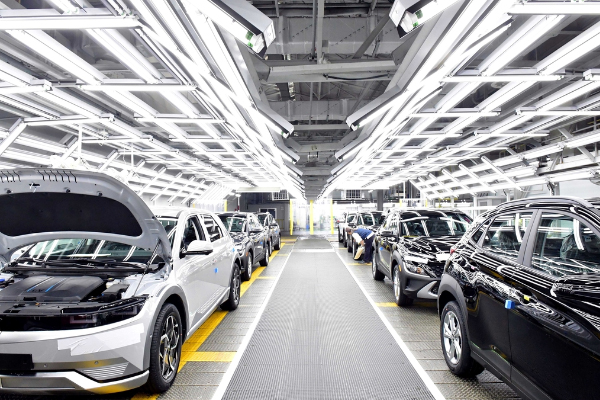News & Event
- Home
- News
- News & Event

According to Pulse by Maeil Business News Korea,
The South Korean government will expand tax benefits on investments in electric vehicle (EV) production facilities by revising the tax law ordinance, allowing companies to receive up to 35 percent in credits, in a move to boost the country’s competitiveness in the bourgeoning EV industry.
Under the revised tax law ordinance announced by the Ministry of Economy and Finance on Tuesday, five technologies and three facilities related to the future means of transportation sector such as EV powertrain system and charging system will be added to the list of national strategic technology subject to support.
Five technologies and three facilities, including clean hydrogen production and hydrogen fuel storage, have also been added in the hydrogen sector.
The announcement comes after the National Assembly passed a revised tax bill that involves adding future vehicles to national strategic technology, in addition to the chips in March. The revision in the enforcement ordinance has specified support targets in the future vehicle sector.
Tax credit systems on national strategic technology sectors offer differentiated benefits on five areas - chips, EVs, vaccines, secondary batteries and display.
The maximum tax credit is raised to 15 percent for large and mid-size companies investing in the technologies and 25 percent for small and mid-size companies. An additional 10 percent credit will be applied this year for the increased average amount of investments made over the previous three years.
“We will provide unprecedented tax support by adding future means of transportation to the list of strategic industries,” said Finance Minister Choo Kyung-ho. Choo’s comments were made on Tuesday as he visited Hyundai Motor Co.’s Ulsan plant.
Korean auto giant Hyundai Motor Group is expected to be the largest beneficiary of the tax law revision as it will benefit from hundreds of billions of won worth of credits.
Hyundai Motor had announced earlier that it will invest 2 trillion won ($1.5 billion) to build a new EV production line in Ulsan. Its smaller sibling Kia Corp. will also spend 1 trillion won to build a facility in Hwaseong, near Seoul.
The facilities are expected to become mother factories that are considered the core in achieving competitiveness in the global EV sector. A mother factory is a main plant that leads product research and development (R&D) and production.
Hyundai Motor Group has decided to build its first EV plant in Georgia as it seeks to benefit from Washington’s Inflation Reduction Act (IRA) that favors automakers that assemble EVs and EV parts in the U.S. Under the IRA, the U.S. government offers up to 30 percent in tax credits to automakers that build EV factories in its country.
In Korea, however, large automakers received less than 1 percent of their investments under the restriction of special taxation act, providing far less motivation for them to invest in facilities in the country.
The latest revision in the tax law, however, is expected to spur investments in EV facilities.
The two EV facilities of Hyundai Motor and Kia are both new factories that are being built for the first time in 29 years in Korea after Hyundai Motor’s Asan plant in 1996.
EV production at the two plants will begin in 2025 when construction is completed in the same year. Kia is expected to churn out up to 150,000 EVs annually at its new plant. The production capacity of Hyundai Motor’s new EV facility has not been decided. Kia also plans to transform its internal combustion engine production facility in Gwangmyeong, near Seoul, into an EV line in the first half of this year.
Hyundai Motor Group plans to invest 24 trillion won by 2030 to enhance the country’s EV industry, with an aim to expand its annual domestic EV production capacity to 1.51 million units by 2030 and global EV production capacity to 3.64 million units.
Hyundai Motor Group sold about 1.1 million EVs so far as of March since it launched sales of BlueOn in July 2011. The auto conglomerate aims to produce three times more EVs in 2030 than what it had sold over the past 12 years.
Hyundai Motor and Kia also plan to expand the number of EV line-ups to 31 models by 2030, including Kia’s large-size sport utility vehicle EV9 to be released this year and Hyundai Motor’s Ioniq 7 SUV next year.
Hyundai Motor Group is also making efforts to advance the country’s EV ecosystem in line with the global shift towards electrification. The group will install Korean-made intelligent robots at its EV facilities in Ulsan and Hwaseong.
The conglomerate will also invest in the development of next-generation EV platforms, core component and advanced technologies, and establishment of research facilities.
The move will allow Hyundai Motor Group to diversify its exclusive platform products and enhance the power electric system and develop technologies that help expand driving range per battery change.
Hyundai Motor Group also plans to establish high-speed charging infrastructures to continue to expand its charging network and maximize drivers’ charging convenience. Hyundai Motor and Kia will also build a quality verification center for its charging infrastructures in the first half of this year to secure a stable and standardized system.
Korea Electric Vehicle Charging Service, an affiliate of Hyundai Motor and Kia, will build 3,000 high-speed chargers by 2025 to meet growing demand in the city area.
Copyrights Pulse by Maeil Business News Korea. All Rights Reserved.
Source: Pulse by Maeil Business News Korea (May 10, 2023)
